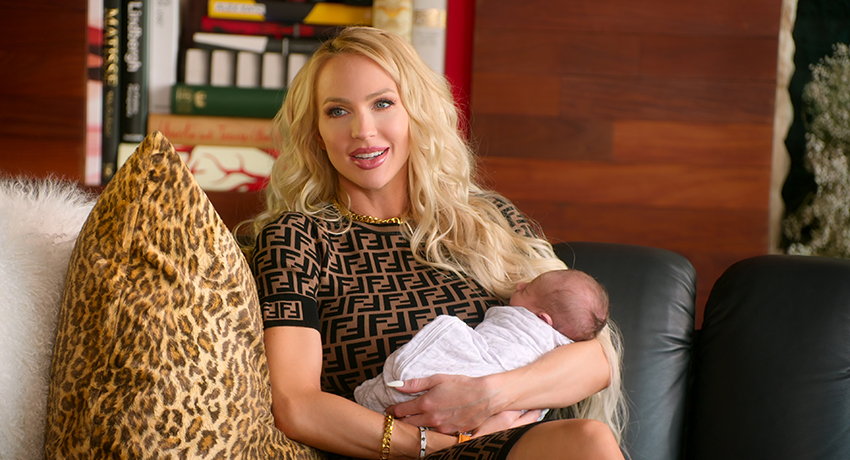Selling Sunset and the Shimmering Edifice of Feminist Capitalism
Like the luxury homes peddled by the hit docu-soap, its version of empowerment is also little more than a lifestyle fantasy.

Real-estate docu-soap Selling Sunset is the hottest reality show on TV, and for good reason: By dishing workplace drama, multimillion-dollar property listings and the petty problems of the rich and famous in equal measure, it’s managed to appeal to voyeurism, masochism and schadenfreude with glittering aplomb.
It flaunts some of the most luxurious homes in the world to an audience of millennials and Gen Z-ers, who — save an act of God or miracle personal injury suit — will never come close to owning property at all. Its stars dress like cartoon supervillains and get into inane arguments and throw ridiculously lavish parties for their dogs. They are petty and mean and spend 90 per cent of the show talking about the least important things you’ve ever encountered in your entire life, and all of this comforts you, because you may not be able to afford a house or a car or a chair-purse, but at least your problems are interesting.
Obviously, I’m fucking obsessed with this show.
My reality-addled brain is reassured by its soft lighting and soothed into a childlike stupor by its many smooth, metallic surfaces. Every clip of dialogue is immediately followed by a low-budget pop song that explains the emotions I should be feeling (empowerment, suspense, girl-bossery) in explicit detail, rendering critical thought obsolete. Watching this show is like doing Xanax in an Apple Store. When Selling Sunset turns on, the communism turns off!
But, at least to me, its manufactured melodrama has begun to grow tiresome. With each consecutive season, Selling Sunset has evolved in the same way as its stars’ increasingly surgically-optimized faces. It’s gotten a little tenser, a little more propped up; its already-artificial facade has been tweaked and lasered to the point of resembling a vaguely satirical uncanny-valley caricature of its younger self. This is admittedly a pretty mean analogy, but it only sounds over the top if you haven’t seen Christine’s lip injections.

Christine Quinn from Selling Sunset Season 4.
Botox aside, though, the part of Selling Sunset that truly fascinates me is its curious feminist logic. The show’s brokerage is run by twin brothers Jason and Brett Oppenheim but ostensibly staffed entirely by young, beautiful women, all of whom incorporate a kind of capitalist grind-set feminism into the fabric of their public personas. They frequently throw around terms like “boss bitch,” “queen” and “you go, girl!” as well as the occasional feminist-y phrase ripped from an Instagram infographic or 2015 H&M T-shirt (“Empowered women empower women,” Chrishell preaches to a chorus of snaps whilst lounging by her new million-dollar pool).
The show shines when it leans into its indulgent, jealousy-porn roots and falls flat in its clumsy attempts to paint its stars’ ladder-climbing as markers of yas-queen feminist power — but in this quest, it inadvertently paints a depressing portrait of the state of popular white feminism in capitalist America.
On the very first episode of Selling Sunset, Oppenheim agent Maya Vander is caught in a tense work conundrum: The playboy bachelor to whom she’s attempting to sell a multimillion-dollar property is dead set on pursuing her romantically. Despite her attempts to politely dodge his advances, he won’t let up; he makes it clear, all but explicitly, that the sale (and her hefty commission) hinges on her perceived sexual availability.
“Is it really a feminist action for a woman to use sexist institutions for personal gain?”
When she complains about the problem to the group, she’s met with understanding nods and familiar chuckles. This scenario isn’t so much a serious problem to them as it is an unavoidable work annoyance, like taking out the garbage in the break room: To the women of Selling Sunset, balancing their availability in the sexual marketplace is just part of the job. Why else would their bosses exclusively hire young, hot women to represent their firm? The only unique thing about Maya’s interaction is that it makes explicit what usually goes unsaid — that she, and her body, were always meant to be part of the deal.
The women of Selling Sunset aren’t only selling houses, they’re selling lifestyles; and, knowingly, they’re selling themselves. The majority of their on-screen deals are with single men, and even when they aren’t, it’s obvious that the aesthetic of a beautiful, light-skinned, wafer-thin woman is part of the luxury fantasy they’re convincing their clients to buy into. The women of the Oppenheim Group don’t seem bothered by this dynamic; rather, they frame it as a unique form of empowerment. To them, beauty is a currency, and to quote one of the many indistinguishable, made-to-order EDM songs that soundtrack their girl-boss activities, “I’m a money money money money maker.”

Mary Fitzgerald in Selling Sunset Season 4.
This, of course, brings to light a question that feminism has struggled with for decades: Is it really a feminist action for a woman to use sexist institutions for personal gain?
Because I’m not writing this essay from the year 2013, my answer is obviously no. Capitalist power is not liberation, particularly when that power is made available by your strict adherence to the Eurocentric beauty standards. These women are all unquestionably excellent at their jobs, truly, but the ever-present unspoken fact of the matter is that if any of them happened to gain 50 pounds or stop wearing Bottega Veneta to the office, they’d be up shit’s creek.
To be clear, the question of whether these women are “victims” is of little interest to me. Like all women who glean power at the expense of the more marginalized, if they are victims, they’re certainly not ones I care very much about (this belief was cemented in Season 4 as I watched the entire brokerage celebrate the impact of Los Angeles’s catastrophic housing shortage on their personal bank accounts). What’s interesting, though, is how Selling Sunset inadvertently illustrates the cracking facade of its own version of individualist feminism.
“To the feminist capitalist, it’s impossible to imagine women’s solidarity as anything more tangible than a branding move.”
One of the show’s most likeable characters is Amanza Smith, a single mom of two kids and one of the brokerage’s only women of colour. Throughout Season 4, she struggles with her deadbeat ex, who abandoned her family and doesn’t pay child support; she reveals that she spent over a year sleeping on a couch so her children could have a bedroom and deals with the trauma of a surprise visit from child protection services after a slanderous anonymous tip. She is the only character in Selling Sunset with serious, tangible problems, and her presence in the show regularly throws its entire internal logic off-kilter. She gets very little screen time, but when she does, it becomes immediately impossible to give a shit about literally any of the other characters or their vapid, one-dimensional drama.
The show repeatedly paints money as a vehicle for feminist power and “hustle” as a vehicle for money. Its individualist, meritocratic logic implies that the only thing any of the show’s women had to do to become multimillionaires was work hard and be the best — that they deserve their untold riches and, implicitly, are good, strong people because they have them.
However, Amanza — objectively the hardest-working and strongest of any of them — is also notably the least successful. Her genuine struggles are often panned as laziness by her coworkers and bosses, who criticize her for spending too much time with her kids and not devoting enough of herself to selling houses. By Season 4, she’s all but retired from her role as a selling agent and appears exclusively to stage other people’s properties. Notably, the girls (who make innumerable references to “loyalty” and being “ride or die” throughout the show’s run) never offer Amanza any of their endless wealth or even a brief respite in any of their multi-bedroom mansions. To the feminist capitalist, it’s impossible to imagine women’s solidarity as anything more tangible than a branding move.
“The ladies of Selling Sunset traffic in aspiration, but even they can barely maintain the constant self-optimization it takes to keep the fantasy alive.”
On the other side of the spectrum, we have the show’s near-comical villain, Christine Quinn, who also happens to be the platonic ideal of the brokerage’s feminist ethic. She’s remarkably competitive, scathingly successful and by far the wealthiest of any of them — and she’s used that wealth to optimize her face and body into a self-described “gothic Barbie” fantasy, which, in a potentially never-ending feedback loop, only increases the efficiency of her money-making pursuits. Christine’s investment in her appearance is a sharp and calculated one: Not only has it contributed to her economic success, but she consistently gets away with vicious cruelty and bold-faced dishonesty in large part because she looks so good while doing it.
Her Season 4 pregnancy only aided her boss-bitch branding exercise. While nine months pregnant, she did complex yoga inversions and sold houses in six-inch heels; she was back to flat-stomached size 2 immediately after giving birth, likely thanks to an implied liposuction.
Reliably, the privileges made available by her immense wealth are what allow her to amass gendered power. The feminist capitalist fantasy is that of a sharp-tongued, ever-glamorous, never-faltering Amazon who doesn’t need anyone but herself; but necessary to this ideal, of course, is both the capitalist desire for independence and the capital means to afford it.
Here’s the thing, though — Christine is miserable. By the end of Season 4, her antiquated version of girl power has left her isolated, reviled and potentially out of work. She’ll be fine, obviously (her unnervingly sycophantic husband has like a billion dollars), but her fall from grace displays the ultimate contradiction in Selling Sunset’s twisted version of feminism. She played the game better than anyone else, and she’s winning — so why isn’t she happy?

Chrishell Stause in Selling Sunset Season 4.
The capitalist feminist’s life is defined by the Sisyphean battle for unending, ungrounded self-improvement but alienated from any form of material liberation. The ladies of Selling Sunset traffic in aspiration, but even they can barely maintain the constant self-optimization it takes to keep the fantasy alive.
These struggles, as one-dimensional as they may seem, are a microcosm for the hustle-culture feminist zeitgeist that turns the patriarchy into a power-tool and the self into an investment opportunity: When your power comes from the commodification of life at the top of the food chain, it necessitates the continued existence of people below you (and their desire to take what you’re selling). This “feminist” position is available only to an immensely privileged select few — the skinny, the light-skinned, the traditionally beautiful — but depends on the aspiration of the unprivileged to give it power. It’s an ideological pyramid scheme. These women aren’t just selling luxury real estate — they’re selling the shimmering edifice of feminist capitalism itself.
Feminist capitalism is beautiful and shiny. It has an outdoor pool and a walk-in closet and a kitchen island. But, just like the soulless, utilitarian glass homes looming over Los Angeles from the comfort of the Hollywood Hills, there’s nothing of substance behind its walls. It, too, is little more than a lifestyle fantasy sold by beautiful women with white teeth in service of an economic machine — and it, too, exists only to give the 99 per cent something to aspire to while they work under the people who can afford it.
Also, Mary and Christine definitely fucked, right?
Related Stories
You Might Also Like
Review: “Deadpool & Wolverine” obliterates the fourth wall
Inside jokes and camera asides power anarchic deconstruction of MCU
By Michael Hollett





